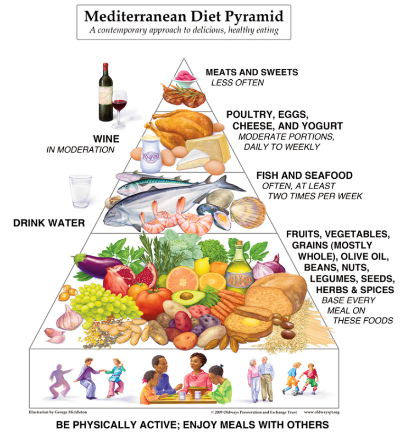Following the Mediterranean Diet can lead to better health

The Mediterranean diet is based on the foods and beverages traditionally consumed by people living in countries along the Mediterranean Sea. It is now recognized as the “gold standard” for eating patterns that promote lifelong good health.
While following a Mediterranean diet does not guarantee better health and increased lifespan, scientists believe that for many people it is a cost-effective way to improve health and prevent chronic disease.
Following the Mediterranean diet can lead to:
- Decreased risk of death from all causes, including heart disease and cancer
- Reduced risk for cardiovascular disease
- Reduction in inflammation which which increases heart disease risk
- Decreased risk for hypertension
- Lower abdominal obesity
- Decreased risk for metabolic syndrome
- Reduced risk for type 2 diabetes
- Improved glycemic control and insulin sensitivity in people with diabetes
- Reduced risk for overall cancer, cancers associated with the gastrointestinal tract and post-menopausal breast cancer
- Reduced risk of stroke, Alzheimer’s disease and dementia
- Improved cognitive function
A landmark study published in 2014 demonstrated that a high-unsaturated fat and antioxidant-rich dietary pattern such as the Mediterranean diet is a useful tool in the prevention of cardiovascular disease (CVD).
What are typical Mediterranean Diet foods?

The Mediterranean diet relies on:
- fresh rather than processed foods
- foods lower in saturated fats, salt and sugar
- plant- based foods rich including fruits, vegetables, whole grains, legumes, beans and nuts
- olive oil as the primary source of fat
- cheese, yogurt, fish, poultry and eggs which are eaten in low to moderate amounts.
- small amount of red meat
- wine, in moderation
The traditional Mediterranean diet consists of minimally processed, seasonally fresh, locally grown grains, vegetables, fruits and nuts eaten at most meals.
Veggies, fruits and nuts, and olives: the core of the diet
Vegetables are an important staple in the diets of all countries bordering the Mediterranean Sea.They provide valuable nutrients such as potassium, folic acid, fiber, carotenoids and other antioxidants. Vegetables are normally cooked or drizzled with olive oil. Olive oil increases absorption of protective carotenoids.
Whole fresh fruit is plentiful in the Mediterranean and is generally served at all meals often as dessert.
Tree nuts, beans, legumes and seeds are good sources of healthy fats, protein, fiber and phytochemicals with antioxidant properties. Walnuts are commonly eaten and provide omega-3 fatty acids, which may be important in preventing many health problems, including heart disease, hypertension and cancer. Omega-3 fatty acids lower triglycerides and have an anti-inflammatory effect on the lining of the blood vessels.
Olives, olive oil, and seasonings
Olives are commonly eaten whole, and the oil is widely used for cooking and flavoring. Olive oil is the primary source of dietary fat used for cooking, baking and for dressing salads and vegetables.
Extra virgin olive oil is highest in health-promoting omega-3 and monounsaturated fats, antioxidants and other important micronutrients. Herbs and spices and other seasonings add flavors and aromas to foods, reducing the need to add salt or fat when cooking.
Raw garlic and onion contain allicin which may protect against heart disease. Capers contain antioxidants and anti-inflammatory compounds.
Download our Greek Salad Recipe
Dairy, meats, and eggs: how much should I eat?
- Cheese and yogurt are eaten regularly in the traditional Mediterranean diet, but in low to moderate amounts.
- Fish and shellfish are important sources of healthy protein for Mediterranean populations.
- Cold water fish such as tuna, herring, sardines and salmon are rich in essential heart-healthy omega-3 fatty acids. Shellfish and crustaceans, including mussels, clams and shrimp, have similar benefits. Fish and shellfish are not typically battered and fried in Mediterranean countries like they are in the United States.
- Eggs are a good source of high-quality protein and can be especially beneficial for individuals who do not eat meat.
- Meats such as lamb, goat, sheep, pork, rabbit and fowl are eaten in small portions.
- Poultry is a good source of lean protein and is lower in saturated fat than most red meat.
Can I have wine with the Mediterranean diet?
Wine is consumed regularly but moderately in the Mediterranean, if not prohibited by religious beliefs. “Moderately” means up to one 5-ounce glass of wine per day for women and up to two 5-ounce glasses for men. Alcohol in moderation is protective against heart disease and red wine contains antioxidants and other substances that also protect against heart disease.
How important is exercise?
A healthy diet is not the only factor affecting the health of the Mediterranean population. The Mediterranean lifestyle is about taking the time to relax and enjoy the company of family and friends. Mealtime is something to share with loved ones – a time to taste and smell and enjoy food, rather than eating on the run. Mealtime is one of the most valued foundations of traditional Mediterranean culture.
Activity is one of the secrets to happiness and long life. Life in the Mediterranean basin is not centered on the automobile. People walk more and drive less than we do in this country. Physical activity provides a sense of physical and emotional well-being, especially when the experience is shared with family or friends.